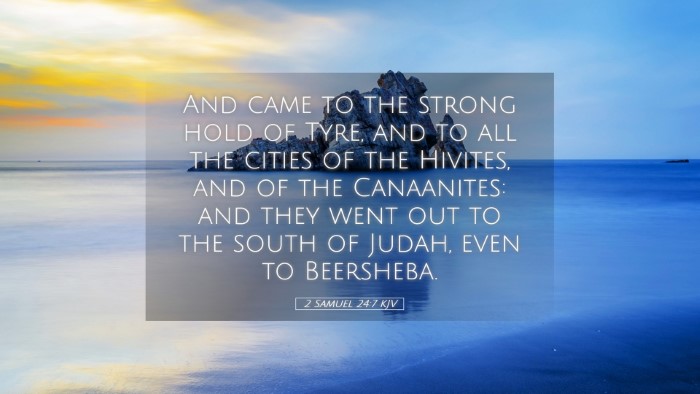Commentary on 2 Samuel 24:7
Verse Context: 2 Samuel 24:7 reads: “And came to the strong hold of Tyre, and to all the cities of the Hivites, and of the Canaanites: and they went out to the south of Judah, even to Beersheba.” This verse depicts a significant event in King David's reign where he ordered a census of Israel, which led to divine displeasure and consequent judgment.
Historical Background
The census that David conducted is often viewed as an indication of pride and self-reliance, as it sought to enumerate the military strength of Israel rather than to trust in God's providence. Understanding this context is vital for comprehending the implications of the actions described.
Insights from Commentaries
Matthew Henry's Commentary
Matthew Henry highlights the moral implications of David's actions in this passage. He suggests that the census reflects a lack of faith in God's promise to sustain and protect Israel. Henry emphasizes that, while counting the people might seem administratively wise, it ultimately signals a heart departing from reliance on divine strength.
- Faith vs. Pride: Henry contrasts faith with pride, indicating that King David's decision stems from a prideful desire to assess his resources rather than trusting in divine providence.
- Punishment and Mercy: The consequences of the census reveal God's justice; several thousand Israelites died due to David’s decisions, thus reflecting the seriousness of sin in leadership.
- Divine Judgment: Henry interprets the results of the census as a stark reminder of the spiritual responsibilities held by leaders.
Albert Barnes' Notes on the Bible
Albert Barnes delves deeper into the geographical references within this verse. His observations provide a framework to understand the broader territorial implications of the census. The mention of Tyre and the cities of the Hivites signifies the extent of David's influence and the strategic military considerations of the time.
- Territorial Assessment: Barnes argues that the census aimed to categorize not just the population but also the geopolitical situation, emphasizing David's role as a unifier in territorial disputes.
- Military Concerns: He discusses that the military essence of the census is crucial for understanding David’s leadership and the need for defense during turbulent times.
- God's Sovereignty: Barnes concludes that regardless of David’s numerical assessments, it is God who ultimately determines Israel's fate and security.
Adam Clarke's Commentary
Adam Clarke provides a more detailed exegesis of the motivations behind the census. He expresses concerns regarding the heart of leadership and the motivations underlying David's actions. Clarke points out the spiritual ramifications that are portrayed through this incident.
- Spiritual Discernment: Clarke urges readers to discern the deeper, spiritual roots of David’s behavior, highlighting that reliance on numbers can often reflect an underlying anxiety about God’s provision.
- Corporate Responsibility: Clarke discusses the implications for the nation as a whole, asserting that the sin of a leader can lead to collective punishment, a lesson deeply embedded within the narrative.
- Return to God: Finally, Clarke points to David's eventual repentance as a key theological point, using this narrative to illustrate the importance of humility and returning to God after wrongdoings.
Theological Reflections
This verse not only serves as a historical account but also as a rich source for theological reflection. The dynamics of sin, judgment, and redemption are woven throughout the narrative. For pastors, scholars, and theologians, the implications of leadership and the importance of faith over self-reliance become paramount.
Leadership Lessons
From this inquiry, several lessons on leadership can be gleaned:
- Humility in Leadership: Leaders must recognize their limitations and the need for divine guidance.
- The Cost of Pride: Actions taken from arrogance can have devastating consequences for both the leader and the community.
- Responsibility towards the Community: Leaders are accountable for their decisions before God, underscoring the need for prayerful consideration in all matters.
Conclusion
2 Samuel 24:7 is a profound illustration of the intersection between divine sovereignty and human accountability. The combined insights from Matthew Henry, Albert Barnes, and Adam Clarke reveal a multifaceted perspective on this pivotal moment in Israel's history. As we unpack this Scripture, the lessons on humility, reliance on God, and the serious nature of leadership decisions resonate deeply within our current ecclesiastical and theological contexts.


